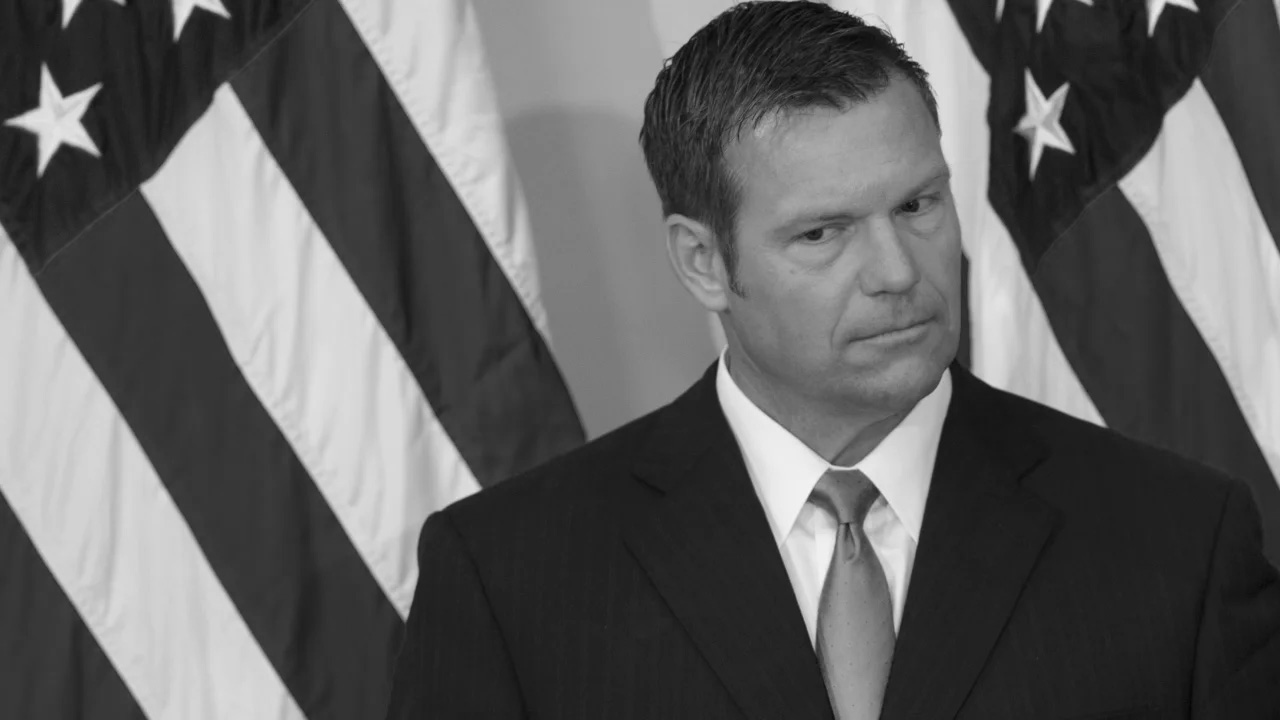The governor is the highest-ranking elected official in the executive branch of state government. Their office carries out the law, but also signs or vetoes any legislation passed by legislators.
The governor prioritizes issues and decides how and where to exercise the office’s power, and all of those choices can impact hundreds or thousands of Kansans. This means that a governor can lead an office that works powerfully and with integrity to uphold and protect Kansans’ civil rights and civil liberties across the state—or can undermine and erode them.
Here's an overview of how Kansas Governor Laura Kelly has exercised power during her ongoing two-term administration to protect civil rights and civil liberties:
Voting Rights
The constitutional right to vote remains central to our democracy and to our system of governance. Through this fundamental right, each of us can take part in the decision-making process in our communities. This is why every elected official should work to strengthen and protect voting rights—including the governor.
The governor oversees the state’s highest election official, the Secretary of State, and can give instruction on various policies related to election administration as well as support or block election-related legislation.
In 2023, Gov. Kelly defended access to democracy with a veto on a bill that would have eliminated the three-day grace period, citing the disenfranchisement of Kansas voters, especially members of the military and rural Kansans. Currently, advance ballots must be post marked by Election Day and received within three days of Election Day. She vetoed numerous, similar legislative attacks on Kansans’ right to vote in previous legislative sessions as well, and notably on the proposed partisan and racial gerrymandered congressional district map in 2022, but was overridden by an extreme legislature.
In the 2024 veto session, Gov. Kelly pushed back against attempts to that would infringe on Kansas voters’ ability to cast a ballot by vetoing House Bill 2614 and House Bill 2618. The veto was sustained later, and the two bills did not become law.
Criminal Legal Reform
Gov. Kelly has vocally supported measures that would address the need for criminal legal reform in the state and pushed for the state to participate in the Justice Reinvestment Initiative.
“It costs Kansas taxpayers nearly $30,000 annually to keep each person incarcerated in Kansas. Safely reducing that price tag gives us the chance to invest in substance use programs and mental health services that help stop the cycle of reoffending. We must re-focus on protecting public safety and rehabilitating offenders so that they can return to society with the skills they need to hold a job, find stable housing, and succeed,” she said in 2020.
The initiative examined various areas withing the state’s criminal justice system. Gov. Kelly said she hoped to provide chances to positively address trends in the state which included high rates of unemployment among the formerly incarcerated.
In 2021, Gov. Kelly announced a decision to commute the sentences of five incarcerated individuals and granted pardons to three more, which was more than any previous Kansas governor. The decision followed independent reviews by the Prison Review Board, Department of Administration, and the Governor’s legal team and included three ACLU of Kansas clients of the Clemency Project.
“Using clemency power is not something I take lightly, nor is it the solution to the systemic issues in our criminal justice system,” she said at the time. “Instead, we’ll keep working towards commonsense reforms to save taxpayers money and offer pathways to prevent crime and to keep people out of the system in the first place.”
While no other Kansas governor has granted that many commutations or pardons at a single time, the eight total recipients were a very small fraction of the historic hundreds of clemency applications submitted in Gov. Kelly’s term and possibly still pending review by her office.
The ACLU’s Redemption Campaign continues to encourage state governors, including Gov. Kelly, to use existing clemency powers in new and transformational ways. For example, Gov. Kelly could grant broad release to large groups of Kansans who are unjustifiably imprisoned under our state’s extremely punitive marijuana and other drug possession laws, or those serving “old law” sentences.
The Kansas Sentencing Act of 1993 changed sentencing guidelines to take into account the type of crime committed and the previous record of the defendant, calling for shorter sentences for property crimes and longer sentences for violent crimes. The Act was intended to correct for racial and geographical disparities. However, the Act was only made retroactive for 2,000 people, so there remain many individuals in Kansas prisons serving sentences under the “old law”. Hundreds of individuals who committed property crimes should have been released by now, if only for a change in the date of their crime or conviction.
Gov. Kelly has the power to right these wrongs: by granting clemency to people who were sentenced under the old laws, Gov. Kelly could correct this unjust result and free people who have been incarcerated for decades—people whose sentences would be illegal if handed out today.
As a defendant in Glendening et al. v. Howard et al., Gov. Kelly’s administration is also partly responsible for the ongoing delays in achieving a positive outcome for people being detained pre-trial and awaiting mental health evaluations and restoration treatment while facing criminal charges. The Kansas Department of Aging and Disability Services long wait-list exacerbates the mental health challenges of people who are already vulnerable, subjects them to prolonged punishment, and violates their Constitutional rights.
Supporting Transgender Children and Kansans
Every elected official—especially the attorney general—should work to defend the community against discrimination rather than actively attacking them. LGBTQ+ Kansans especially face discrimination because of their LGBTQ+ identities at their work, in their homes, and in the public sphere—and there are few laws in place to protect them in the state. More than ever, transgender rights have been the target of extreme politicians.
In her term as governor, in the face of particularly vicious legislation seemingly aimed at the erasure of the LGBTQ+ community, Kelly has vowed to veto any bill attacking transgender Kansans. In some cases, state lawmakers have overridden her veto. In 2023, Kelly vetoed bills attacking transgender student athletes’ participation in sports and field trips, transgender children’s ability to access gender-affirming medical care, and transgender people in prison, and Senate Bill 180, a bill that amended state law to codify narrow definitions of gender and represented an attempt by extremist politicians to erase transgender people from public spaces. The legislature unfortunately overrode her vetoes, and both SB 180 and the sports ban became law in Kansas.
In the 2024 session, Gov. Kelly vetoed Senate Bill 233, which would have been one of the most extreme anti-trans laws in the country by attacking access to life-saving medical care for transgender youth that would remain available to non-trans youth, and also would have prohibited a wide range of conduct by state employees who support and care for transgender students. Thankfully, the legislature sustained the veto by a narrow margin and the bill did not become law.
Immigration
The Governor’s record on immigration has been a mixed bag.
She vetoed a bill in 2023 that would have made state-level human smuggling a crime, despite claims from supporters that the measure would help law enforcement prosecute those transporting undocumented immigrants. Kelly balked, describing the legislation as “rushed,” and adding that it could lead to unintended problems including trampling on the due process rights for individuals who have been allegedly smuggled.
But Gov. Kelly also shocked and disappointed many Kansans by signing into law House Bill 2717, which bans sanctuary cities in the state. This effectively halted a Wyandotte County ordinance that sought to protect community members by prohibiting local authorities from working with Immigrations and Customs Enforcement. Gov. Kelly’s move was a devastating blow to the immigrant community in Kansas.
In 2024, Gov. Kelly vetoed the discriminatory and broad Senate Bill 172, which would have banned ownership land based on country of origin and followed a flurry of fear-based rhetoric. The bill did not become law.
Expression and Equity on Campuses
In the 2024 session, Gov. Kelly allowed House Bill 2105, an anti-DEI bill that applies to higher education, to become law without her signature. This was a deeply troubling outcome and contributes to the persistent threat of harmful legislation that seeks to undermine diversity, equity, and inclusion initiatives in Kansas.
Supporting Reproductive Rights
Bodily autonomy and reproductive freedom are our most essential—and personal—constitutional liberties. Whether or not to have a child is an extremely personal health care decision between a pregnant person, their family, and their medical provider. Abortion is one of the safest medical procedures. It has a 99% success rate, according to the Centers for Disease Control and Prevention.
Gov. Kelly vetoed anti-reproductive freedom legislation in 2023, including a bill that would have required clinics to incorrectly tell patients that a medication abortion could be stopped using an unproven drug regimen. Her move followed a resounding statewide vote affirming abortion rights in August 2022.
“Kansans made clear that they believe personal healthcare decisions should be made between a woman and her doctor, not politicians in Topeka,” Gov. Kelly said at the time.
In the 2024 legislative session, Gov. Kelly continued to defend our reproductive freedoms on a number of extremist efforts, but unfortunately was overridden on House Bill 2749, requiring medical facilities and providers to intrusively survey and report patients’ reasons for abortions, and on House Bill 2436, which creates a new felony crime of abortion coercion (but not for forced birth). Gov. Kelly also vetoed SB 232, another effort by extreme politicians to intrude on families’ personal and private medical decisions by requiring child support for unborn children and by attempting to codify fetal personhood.
________________________________________________
What can a concerned Kansan do? If you found this information helpful, plug into the Civil Liberties Beehive to learn how we can change the landscape of Kansas to ensure our officials are accountable and respect our fundamental rights and values.
Date
Monday, May 20, 2024 - 12:15pmFeatured image

